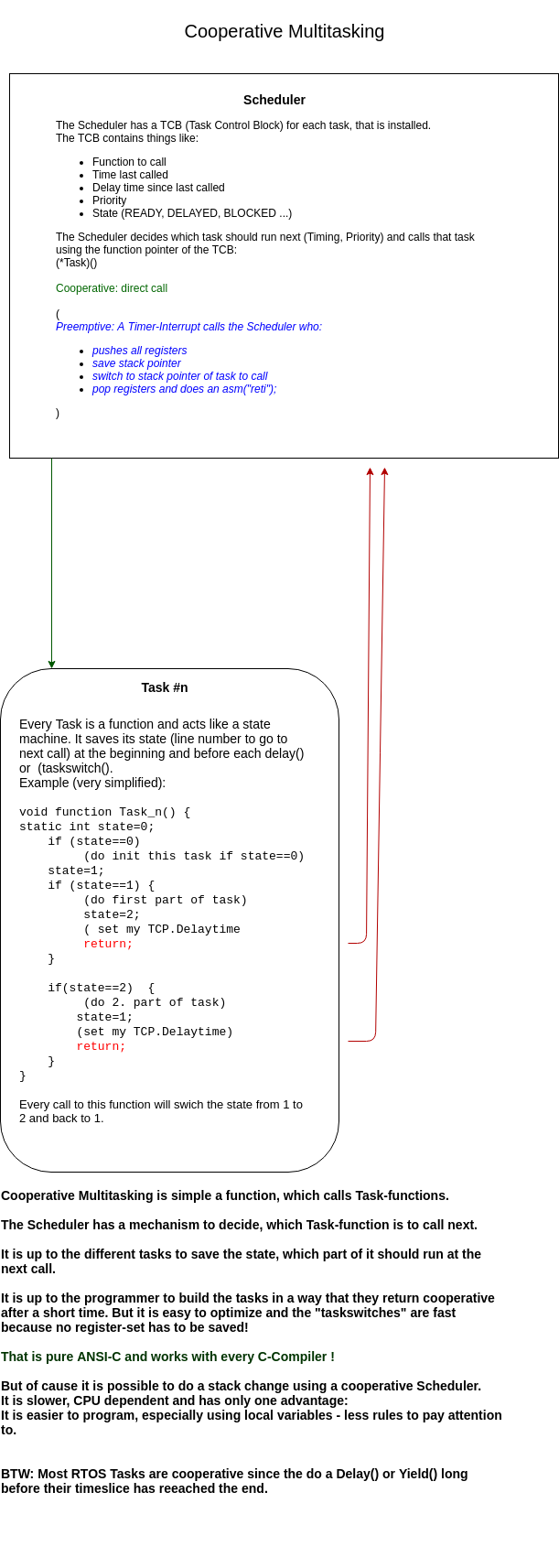#Esp8266 #Interrupts #CoopOS #NoiseReduction
HC-SR04 gets a 10µs Trigger pulse, sends 8 cycles of 40 Khz tone and:
- sets Echo signal HIGH
- sets Echo signal LOW, when Echo arrived:
IrqActive:
true false
______________________________________
| |
____| |_______
Task1_10us:
____
| |
_____| |_____
Interrupt:
_____________________________
| |
____________| |_______
mStart mEnd
measured
time: <--------------------------->
Here I use my CoopOS to start different Tasks and the use of interrupts.
The first level is an Interrupt routine:
// Interrupt as response "Echo"of 10µs "Trigger" signal
void IRQ_Echo() {
IrqCount++;
if (*GPIO_IN & 1) { // this is rising edge a pin 0 = D3
mStart=micros();
}
else {
mEnd=micros(); // falling edge
IrqActive=false; // IRQ measurement is reaDY
}
}
It is a "CHANGE" interrupt which is called by the Echo-evens mStart and mEnd of the HC-SR04.
To produce such interrupts the HC-SR04 must get a 10 µs pulse at "Trigger" line.
This is done by CoopOS Task_10us:
A measurement cycle is started from Task1 :
- set IrqActive=true;
- sends 10µs Trigger signal
- waits for IrqActive=LOW OR Timeout
- filters the result:
//-----------------------------
// Send 10 µs High-Pulse and
// wait for irq ready, delay, then next pulse
uint32_t Task_10us() {
static int counter;
taskBegin();
// send one 10µs pulse, then stop
while(1) {
IrqActive=true; // reset by IRQ falling edge
GPOS = (1<<D5); // send 10µs pulse
taskDelay(10);
GPOC = (1<<D5);
// wait on answer of interrupt routine - timeout 100*1000 µs =100ms
counter=0;
while((IrqActive==true) && (counter<100)) {
taskDelay(1000); counter++;
}
if (counter<100) { // no timeout
diff= (double)(mEnd-mStart);
if (diff<20000) {
value=value*0.9 + (0.1*diff); // filtering for noise reduction
}
}
else value=0; // timeout: no answer pulse
taskDelay(20000);
if(diff<2000) { // small distances need extra delay !
taskDelay(10000);
}
// Next pulse is initiated now
}
taskEnd();
}
if (counter<100) { // no timeout
diff= (double)(mEnd-mStart);
if (diff<20000) {
value=value*0.9 + (0.1*diff); // filtering for noise reduction
}
}
and starts again after a delay of 20 ms (30 ms if the distance to measure is small)
About 30 measurements per second are done.
The time mStart and mEnd are measured with an interrupt routine, which fires at both edges.
It tests the edge(up,down) and remebers mStart, mEnd.
It just reads the values produces by Task1 and prints the results every 500 ms (twice a second) an shows some alarms like
- Timeout (val==0)
- distances lower than 300 mm (as an example)
- when something changes the measured distance suddenly (like a cat runnung through the echo path ;)
Here the output is done with a subclass of *Stream* and is written to OutBuf[] which is much faster.
The Task MySer prints the contents of the buffer - every 50 µs one character.
So the gaps in calling the Scheduler are reduced to about a maximum of 14µs.
MyYser stretches the serial output to one character every 50 µs and write to the Uart-Fifo directly.
The Scheduler here is called every 3 µs - when serial output is done it is prolonged to 40 µs.
That is acceptable in most programs.
** CoopOS cycle time during serial output:**

CoopOS does cooperative multitasking written in pure ANSI-C.
- It is very fast (here up to 200000 task switcher per second).
- has a small footprint (here 28 bytes per task ).
- reliable
- using microseconds, not milliseconds !
- Less than 100 lines of code
Warning
CoopOS is NOT intended to do numbercrunching !
A lot of time (more than 50%) is used to manage itself.
That's not a failure but a feature;
It is not possible to reach more than 160000 taskswitches per second using only a little amount of processor time.
But it is possible to test for instandce a whole port and start - if any pin has changed - a task blocked until then.
You can do it before the scheduler is doing its normal work and that can be as fast as an interrupt - but you have all the possibilities>br>
of a task instead of an interrupt routine.
That is possible because the Scheduler() is a small function in your source code - not a big library. So it is easy to customize it for your needs!
The goal is to call as many tasks (or parts of it) as possible, run them very often and with reliable timings and low jitter.
Useful examples: Sample and filter values from an AD-Converter, using Rotary Dials, get serial input as commands,
working with Shift Registers, running stepper motors ...etc.
This is for all the embedded systems, which do NOTHING most of the time. And that is right for most of them.>br>
Note
There is an Esp8266 freeRTOS SDK version
Test it - if it may fulfills your timing neeeds!
This is the central part of the
Priority=0;
MaxPriority=-1;
MaxPTask=-1;
for (int i=0; i<nTasks;i++) {
thisTask=&Tasks[i];
// 1. look for tasks which are READY now
if (thisTask->State == DELAYED) { // State: DELAYED -> READY
if ((micros() - thisTask->LastCalled) > thisTask->Delay) {
thisTask->Delay=0;
thisTask->State=READY;
}
}
// 2. look for the READY task with the highest priority
if (thisTask->State == READY) {
if (thisTask->Priority > MaxPriority) {
MaxPriority = thisTask->Priority;
MaxPTask=i;
}
}
} // for
